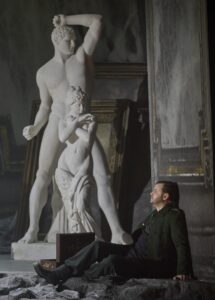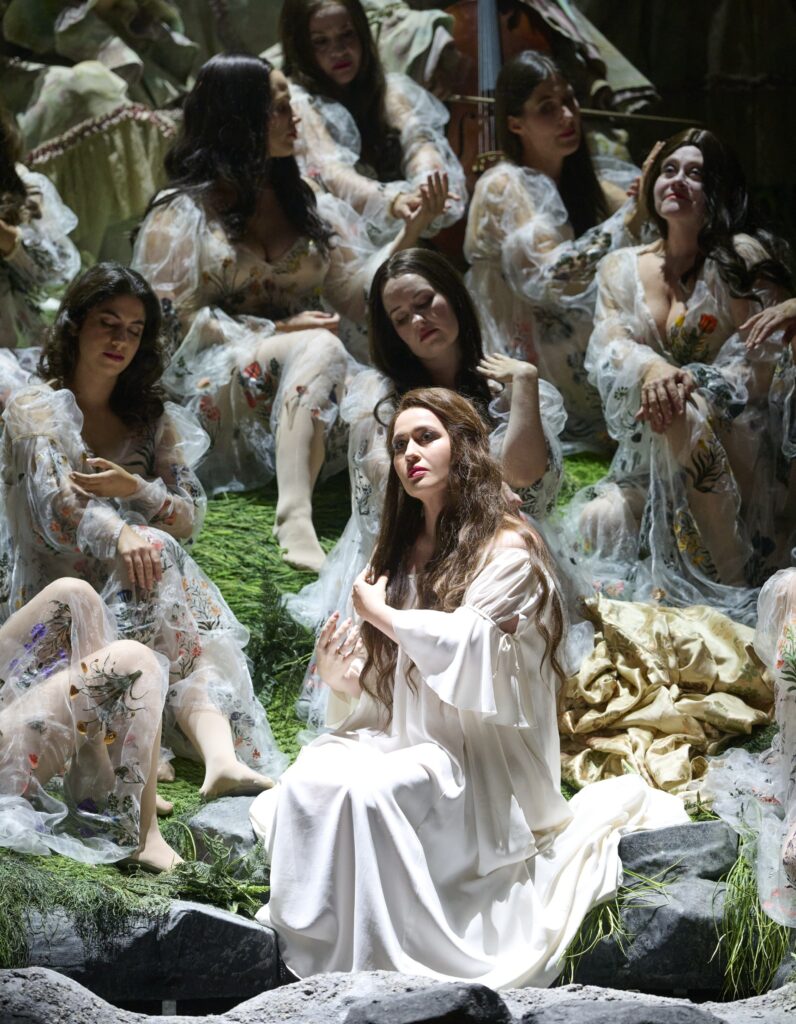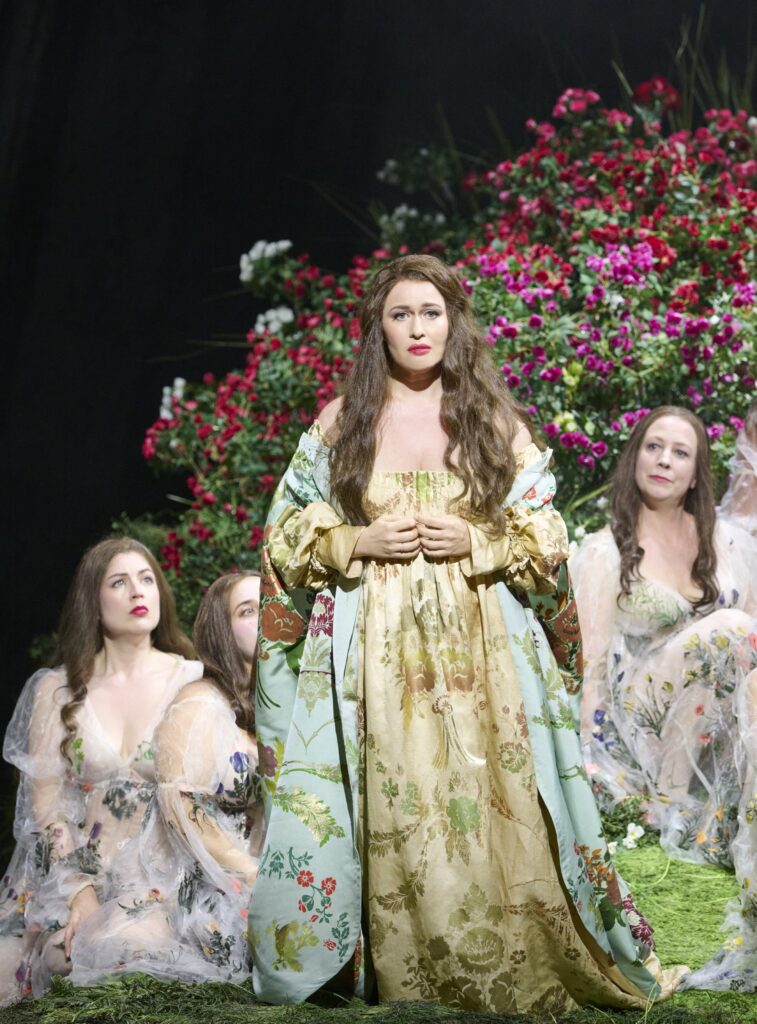Vienna State Opera’s Iolantha opens with a troupe of women dancing, in floating, floral-patterned lace gowns, as if in an earth dance ritual, celebrating the solstice; some sitting in the long grass, the stage bursting with red flowers. Then they are combing their long hair, like in a 1960s hippy commune ; but all are female. Martha (Monika Bohinec), wearing a stern, black suit, asks her charge, the blind Iolantha (Elena Stikhina), My little one, are you tired? – ‘Oh, Martha, I think I want something, but I don’t know what.’- ‘How could I be untroubled, when you’re so upset’. Has the music upset her? She thanks them, (an ad-hoc chamber group), they play very well. ‘Pick some flowers for me. The scent of petals is soothing.’
‘Are the eyes just for weeping‘, sings Stikhina’s Iolantha poignantly. Vienna’s staging, (Rufus Didwiszus) idyllic, evoking nature, is stunning, a treat for our eyes. ‘Why didn’t they tell her before? All her days of heavenly sunrise’, sings Iolantha. Now why does she hear only the sound of sobbing, when a nightingale sings? Why, Martha?’ Stikhina’s soprano expressive, innocent but powerful.
‘Brigitta, Laura, Martha, is that you that I hear?’ -‘Thank you, dear friends.’ The blind girl in the 19th century, an age of religion, represented innocence, an icon for Christian faith, as in J.E. Millais’ painting ‘The Blind Girl’, beneath a rainbow, with her child-sister, holding a concertina.
In Iolantha, her father, King Renée (Bulgarian bass Ivo Stanchev) hides her from the world. She is ignorant of her blindness; no mention of seeing, or light. Rene meets the Doctor Ibn-Hakia (Attila Mokus), a mysterious, monk-like figure in a grey hoodie. Rene complains, you’ve no sympathy for a pitying father. Hakia comments, of the the two worlds of the flesh and spirit, which are only partially separable. (A weird instrument is heard- like a phone going off?) Martha sings, it’s possible for the will to illuminate the truth.
In a highlight scene, in the enchanted rose garden, the prospective suitors, friends, confront each other over Iolantha. It turns out Robert has fallen in love with another, (Mathilde), and requests a dissolution of the engagement. Boris Pinkhasovich, is dressed unbelievably casually, scruffy in a singlet and shorts: like a British holidaymaker of old. She senses a rift between friends Robert and Vaudemont (Dmytro Popov), Robert obviously no longer interested in Iolantha. Rather, he’s ecstatic over Mathilde.
 Russian-Austrian baritone Pinkasovich is outstanding, lost in dreams of midnight: enthusing on the face (Mathilde’s) of a goddess. One more beautiful than lilies of the forest, he sings. Hurry home! Come radiant angel. Robert, excellently sung, albeit old-school. It’s played and sung straight. (Where’s the irony?) It’s gushing, emotional, over-the-top. But what are those classical statues in the garden? Heroic poses, male heroes from Greek mythology; perhaps hinting at Tchaikovsky’s repressed homosexuality?
Russian-Austrian baritone Pinkasovich is outstanding, lost in dreams of midnight: enthusing on the face (Mathilde’s) of a goddess. One more beautiful than lilies of the forest, he sings. Hurry home! Come radiant angel. Robert, excellently sung, albeit old-school. It’s played and sung straight. (Where’s the irony?) It’s gushing, emotional, over-the-top. But what are those classical statues in the garden? Heroic poses, male heroes from Greek mythology; perhaps hinting at Tchaikovsky’s repressed homosexuality?
Iolantha, delighted by the Vaudemont’s visit, and surrounded by friendly strangers, offers her servant bring some wine to revive the company. Then, outside, in a lustrous gold gown, Iolantha sits high-up, the blind girl, with Vaudemont, overlooking the idyllic rural scene. Dmitry Popov’s a very impressive tenor, his Vaudemont dressed plainly, slim, hirsute in black suit jacket and trousers.
Iolanthe intended to pull a white rose for him, but mistakenly, repeatedly plucks red roses. Testing her, he wants to know, ‘how many roses have I pulled?’ Then realizes,  Oh, God, she is blind, poor girl. She, bemused, Oh good sir, tell me, what am I guilty of? Teach me! (how to see.)
Oh, God, she is blind, poor girl. She, bemused, Oh good sir, tell me, what am I guilty of? Teach me! (how to see.)
Without seeing, what is to remind them of their reverie? What are eyes for? What does it mean to see, to be blessed by divine light? Vaudemont explains what it is to be blind; not to fully appreciate the wonders of creation. Light is God’s first gift to the world. He wants her to share what he feels, see what he sees. ‘He revealed to me what I had never known in my life’, she tells René.
The King confides in Dr. Hakia. What are her chances? But Hakia has doubts. She must be told about her blindness; she must will to see to be cured. The King lays down conditions, like a tyrant. If the cure doesn’t succeed, Vaudemont must be executed.
Nevertheless Vaudemont visits the prohibited garden. In their moving scene, Iolantha beckons to Vaudemont, ‘let me touch your face’, Popov and Stikhina are tenderly affecting.
So in the plot, Iolanthe agrees to Hakia’s treatment. (The king retracts his threats; Vaudemont was right to tell Iolanthe about blindness.) Vaudemont asks for Iolantha’s hand in marriage; the King annuls Robert’s engagement, and promises Iolanthe to Vaudemont. Popov’s Vaudemont surging with emotion, sings he’d marry her anyway, even if she were blind.
The curse about transgressing holy ground we might see as pure hokum. But Ibn-Hakim, a spiritual healer, is an example of the spiritualist movement, prevalent end of 19th century, (as in Austria, Rudolph Steiner’s theosophy). This might explain the early scenes of women frolicking in ecstasy.
As to the opera, this is all very well performed, with some exceptional roles, Pinkhasovich’s Robert, Popov’s Vaudemont. What is not to like? Tchaikovsky’s music is beguiling, whatever, with Vienna State Opera Orchestra and Chorus under Timur Zangiev. But it all seems unashamedly old-hat. At times it’s crying out for irony. (Sorry, it’s my British sense of humour.)
So Iolanthe, Oh, great eternal God, you appeared before me. She pleads to her father, protect me in the new world of light. Oh, lord hear this praise from your humble servant. You have given her the gift of light. Stikhina’s performance is tender and sincere, her soprano pure and resonant. But Elena Stikhina cast as the innocent heroine? She’s too sexy!
They approach the stage, the Chorus now on a dimly lit set, to engage the dark, now seeing. Praise be you, Lord! Rousing, Tchaikovsky’s music gloriously melodic, how can we resist?
The Finale in Titov’s production was all too kitsch, for this end of 19th century idyll. There’s even a trio of 1980s gay stereotypes, straight out of a San Francisco club. They all praise God and the wonder of healing. The whole cast seemed to be on stage, self-congratulatory, singing their hearts out. You’re half-expecting the Vienna audience to join in, sing along, (mercifully, not in Russian.) PR.© 10.9.2025
Photos © Boris Pinkhasovich (Robert); Dmytro Popov (Count Vaudemont); Ivo Stanchev (René)
© Wiener Staatsoper/ Michael Pöhn


